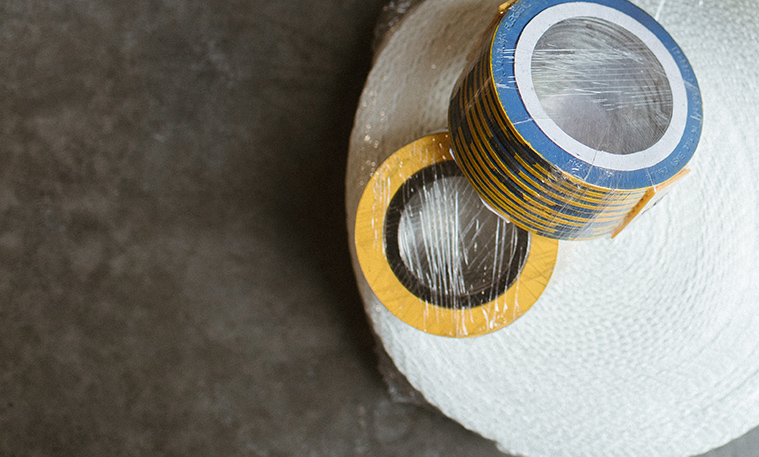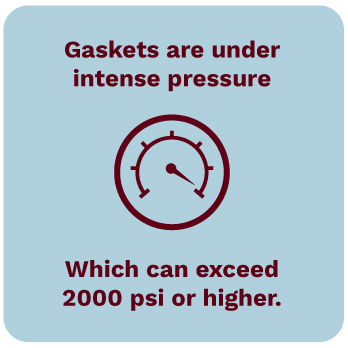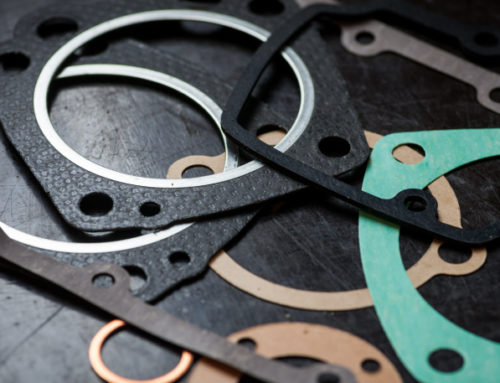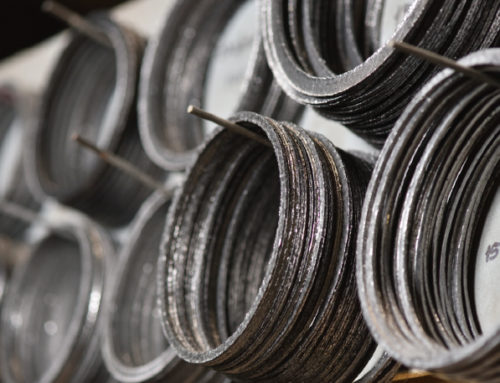Almost any industrial application will incorporate a gasket. Gaskets create a seal between two surfaces, preventing leaks, either from or into the joined objects. Like many parts used in industrial applications, there are about as many types of gaskets and fluid sealing solutions as there are applications.
Types of gasket materials include metallic, semi-metallic and non-metallic. Each offers a unique strength to maintain the integrity of a seal. Factors like the medium to be preserved, the amount of tension and compression the seal undergoes, and even the materials that are joined play an important role in choosing the right type of gasket for an industrial application.
The Major Types of Gasket Materials
Gaskets are most often made from a flat material sheet that is then cut to fit the surface to be sealed.
Common types of gasket materials include:
- Paper
- Rubber
- Silicone
- Metal
- Fiberglass
- Cork
- Felt
- Neoprene
- Nitrile rubber
- PTFE
- Plastic polymers
A gasket should be able to be compressed as well as form to the sometimes irregular surfaces it is joining. Most gaskets are under intense pressure, which can exceed 2000 psi or higher. One of the truisms of gaskets is that the more compressive load exerted on the gasket, the longer it lasts. Most gasket manufacturers will place their gaskets under a series of high compression tests and publish the results of these tests.
How to Choose the Right Gasket for Your Industrial Application
When selecting a gasket for an application, there are a few factors to consider:
- Operating conditions
- Medium compatibility
- Mechanical features of the joint
- Characteristics of the gasket
The operating conditions can include the operating pressure, the operating temperature, and any environmental factors, such as erosion from water or soil. Medium compatibility is an important factor when your application is one that involves food or beverages, acidic or other corrosive materials, or materials that must have the least leakage possible.
The mechanical features of the joint must be taken into consideration. Note how the joint moves, what angles it joins at, and so on. Consider also maintenance of the joint and how that can be made easier with a longer lasting gasket.
Finally, you will want to consider the characteristics of the different types of gaskets. Each gasket has its strengths and weaknesses, making many specific to certain types of applications.
Uses for Metallic Gasket Types

The most common joint type that metallic gaskets come in is a ring-type-joint, also called a ring gasket. These are most commonly used in the oil and gas industry, where high pressures and tight seals are integral to maintain production. These gaskets come in many different sizes and shapes, from oval to octagonal and more.
Other types of metallic gaskets include:
- Grooved or camprofile gaskets
- Spiral wound gaskets
- Corrugated metal gaskets
- Metal-jacketed gaskets
These gasket types can be found in applications like heat exchangers, compressors, condensers, pumps, valves, and turbines.
Uses for Non-Metallic Gaskets
This type of gasket is used when corrosion resistance is of greatest importance. They have a more limited temperature and pressure range, with most operating in low temperature ranges. They are commonly made from a composite sheet material, such as:
- Biaxially oriented PTFE
- Flexible graphite
- Mica
- Ceramic fiber
- Elastomeric and fiber sheet
- Compressed non-asbestos sheet
- Expanded PTFE
- Glass-filled or reprocessed PTFE
It is essential to choose the right material to make sure that the gasket is leak-proof. The criteria you should use when choosing the right material can include:
- Temperature resistance
- Chemical resistance
- Flexibility
- Friction
- Strength
- Compression strength
This gasket type is most common in applications such as pipes, heat exchangers, compressors, and bonnet valves.
Metallic & Non-Metallic Gaskets from NW Industrial Sales, LLC
If you are unsure which gasket type best fits your needs, NW Industrial Sales, LLC offers a large inventory of parts from top industrial gaskets manufacturers. We also offer a combined 75 years serving a variety of industries as diverse as mining, oil and gas, agriculture and grain, and pulp and paper.
As agents of Rexnord’s Industrial Services division, we have access to a nationwide network for repair, remanufacturing, and predictive maintenance services. We are available 24/7 to help meet your needs. Contact us today.



